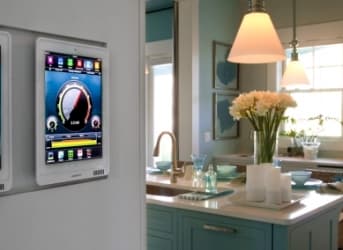It has become conventional wisdom that the wave of the future is “smart home” technology from smart utility meters that read a houses energy usage automatically to smart lights that turn off when not in use. The industry has been in development for years, but moved to the forefront of the start-up world when Google bought Nest Labs last year for more than $3B. Nest Labs makes a variety of smart home devices including thermostats and smoke alarms.
Smart home technology marries two of the most talked about trends in business right now – the internet of things and green technology. Given the excitement around these products then, it is little surprise that smart home devices from Nest and others have been able to command astronomical price tags in home improvement stores across the country. Related: Off-Grid Solar Threatens Utilites In The Next Decade
How useful are smart home devices really though? A recent report by the British government suggests that the smart home revolution may be starting to hit some bumps in the road. The British government wanted to begin a national rollout of smart meters to all households across the UK this year. Smart meters are utility meters outside of a home that automatically read energy usage by a house and send that information wirelessly to the utility company. This avoids companies having to estimate bills for customers, cuts down on the costs of meter reading by utility company employees, and can provide consumers with useful information to save money by monitoring energy usage in real time. The most obvious application is in the area of electric meters, but gas meters and water meters also have potential as well.
As the British are discovering with smart meters, what sounds good on paper does not always work in reality. Problems that are cropping up include difficulty with people who are switching energy companies, labor shortages for the necessary 50 million plus installations of smart meters, and technology compatibility issues. The smart meters are going to cost UK consumers roughly $300 apiece spread out over several years. But the savings that come from smart home tech are far from assured. Related: Top 5 Richest Tycoons In Renewable Energy
Smart home equipment does not come cheap. Most smart home devices cost several hundred dollars bringing the cost of a complete home upgrade to thousands. Yet smart home companies cite an average saving up about 10% or roughly $100 per year for the average household. Even the least financially savvy consumers are likely to balk at the idea of spending $5,000 to upgrade their home with technology that will save them $100 a year for the life of that technology. Part of the selling point for this technology may be consumers wanting to help with climate change issues, but saving money alone is unlikely to drive the technology forward.
Perhaps the best evidence for how shaky the case is for smart home tech is not who is talking about it, but who is not talking about it. The US Department of Energy under the current administration has made repeated appeals to consumers to upgrade the energy efficiency of their home. But while solar panels, weatherization, and high efficiency appliances all get prominent mentions by the DOE, smart home technology is not a major talking point on that agency’s website. Related: What’s Really Behind The U.S Crude Oil Build
Instead the DOE’s focus seems to be on the so-called “smart grid” which revolves around improving automation in the infrastructure that delivers energy to consumers. That implies that the government thinks this area is where the biggest savings and energy efficiency improvements can be achieved. Of course smart meters would fall into the smart grid category. And as the British are discovering, new technology does not always live up to the hype. And if the reality is disappointing for the most promising technologies like smart meters in the smart gird, then how likely are other smart technologies to live up to their own hype?
By Michael McDonald for Oilprice.com
ADVERTISEMENT
More Top Reads From Oilprice.com:
- Who Will Control The World’s Water: Governments Or Corporations?
- U.S. Seizes On Venezuelan Weakness To Regain Caribbean Energy Foothold
- OPEC Boosting Production To Keep Pressure On U.S. Shale


















